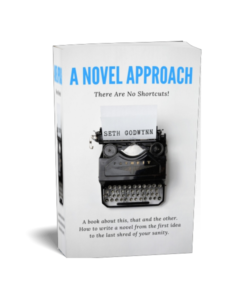Scams - Part 1 (Vanity and Hybrid-Publishing)
By: Does it even matter at this point?
So you’ve finished writing your novel. You’ve planned a great story, one with a fantastic and detailed plot that highlights your fascinating, vibrant characters. You’ve embedded a strong emotional core, and the narrative is littered with literary markers, metaphors and rich symbolism.
So what do you do now to bring your brilliant world-changing piece of work to the audience? This, for most people, is where it all goes spectacularly wrong.
The horrible fact of this industry is that very few of us ever get traditionally published. The odds of any author successfully following that path are statistically zero. And if, on the off chance you are lucky enough to get picked up by a large publishing house, the likelihood is that you’d join the 98% of other ‘successful’ authors who make no money whatsoever. You would also need an extensively developed reputation and tick all the right boxes. That does not mean your writing would be of a respectable standard, it would mean that you fit the right demographic and would be buying into the right political agenda. These days, nothing less will do!
For this reason, most of us prefer the self-publishing route. But no matter which way you choose, the path forward is a dangerous one; the waters you must navigate are deep, and there are sharks everywhere.
The first thing to be wary of is ‘hybrid publishers.’ It used to be that the ‘Writer’s Digest’ was a trustworthy publication that only listed genuine opportunities. Those days are now behind us. You will find many ‘publishers’ looking for new authors, and many of them will turn out to be the new hybrid variety.
In plain and simple terms, these services are scams.

It began with ‘vanity press’ publishing. This was a scheme where aspiring authors could pay to have their books printed. Those books were then theirs to sell, in theory, and they could make whatever money on top of the printing process that there was to earn. In practice, the costs were so high that there was no profit to be had.
Under vanity press publishing, the writer meets all of the costs: they pay for editing, formatting, cover design, printing, binding, shipping, marketing and sales.
There are many stories of writers receiving a box of books in the post, printed to a second rate standard, and being horribly disappointed. They were likely sold all manner of dreams, but ultimately the vanity press publisher fulfilled its end of the bargain at the lowest possible cost to themselves.
Of course, there’s a good reason these services still exist, and why they’re called ‘vanity press.’ It feels good to have your words ‘professionally’ printed and bound in a tangible form you can hold in your hands, and leaving a copy on your coffee table is always a good conversation starter when you have guests. If these are the limits of your expectations, and you’re under no illusion that it means anything real, then by all means go for it! Did you know you can also acquire an aristocratic title (with no legal privilege) by way of purchasing a square foot of land in the Scottish Highlands?
A more common service these days is hybrid publishing, which is just an alternative approach to what is effectively the same end. The concept behind hybrid publishing is that the ‘publisher’ publishes the book on the writer’s behalf, while charging them a fee to produce it.
Each hybrid publisher has a slightly different process, and some have a multi-tiered system whereby you can pay different amounts for different levels of service. They all seem reasonable on the surface, and it’s a tempting offer to a new author who might feel that they have few other options. The rationale is that the money you pay is an investment in building your future, but there is one overwhelming truth about all of these publishers. They make their money from the author, not from the audience.
What that means to you is that these hybrid-publishers have no interest in marketing the books, because they know first hand that marketing is incredibly hard and expensive. They also know that they’re getting mostly first-time and inexperienced authors whose work won’t be particularly marketable. They are geared, therefore, towards earning their money from the writer, by charging as much as possible to produce books they’ll probably never have to print a single copy of. In every case, the hybrid publisher will lose all interest in you once they have your money.
Like the vanity press of old, these people don’t need to do very much to fulfil their end of the bargain, and they aren’t known for going above and beyond. It’s a simple matter of getting your work listed on a reasonable number of shops and outlets. Of course, without marketing and support, you won’t get the customers you are hoping for.
So to recap, hybrid publishers charge you a hefty fee to produce your book, and then do the bare minimum required to make it available to online retailers.
If you’re not capable of editing and formatting your own work, then it might almost seem like a reasonable exchange. Don’t make the mistake of thinking they care about the quality of your writing, though—they don’t, and the whole editing and formatting process will likely be an automated algorithm; human eyes will probably never see a single word. It helps to think of it as a predatory business model, unscrupulous sharks making their money from your desperation.
Even worse, and it can get worse, they often require you to sign away your rights to your own work. If your novel did become successful, you would have then lost control of it.
Another form of predatory publishing scam that people rarely talk about is the Amazon Kindle model. You can tell everything you need to know about Amazon by looking at their terms of practice and conduct. When a major publishing platform has no barrier to entry, no assurance of any kind of literary standard, it screams loudly and clearly that they have no interest in quality, only bulk.
They make money from every author and writer who posts on their site. Someone clicks to buy your book accidentally, and they make money. You might also sell half a dozen copies to friends and family (who will likely never read it), or someone might check out a few pages on Kindle Unlimited out of interest, and they make money. The cost to them to host a single book is effectively zero, and every book will make them something. Multiply that by every book they host, and you soon come to realise that peddling unintelligible garbage hastily thrown together by the illiterate is not just an inevitability, but is at the very core of their business model. They want as many people posting as much material as possible, because it’s a numbers game. In doing so, they’ve strangled independent publishing, earning indie authors a terrible reputation and teaching the audience to steer well clear of first-time writers.
You may think it costs nothing to put your books on Amazon, but cost isn’t always measured in pure monetary terms. Writing a book takes a lot of time, and you’re letting Amazon profit off of it, while giving you nothing. It is also costing you your reputation, and is seriously impinging on your potential literary future.
For this reason, it’s never advisable to use Amazon exclusively. They promise you ‘powerful marketing tools,’ but search those yourself and you’ll quickly find that the tools don’t seem to really exist, and the overwhelmingly vast majority of people posting on Amazon will get absolutely nowhere.

The traditional publishers are only interested in things they know they can make a decent return on, but are so unsuccessful at selecting what the audience is interested in that they only survive on around 2% of their catalogue. Vanity press publishers will send you a few copies of your book and laugh at you. Hybrid publishers are essentially the same, only without the book copies—most do their work primarily digitally, and the rest profiteer from sheer volume.
The truth of this industry is that if a publisher is genuinely interested in your work, they will pay you—they will never ask you to pay them. And make no mistake, they are not going to be interested in your work, unless it is something they think they can sell. They’re also not going to think your work is something they can sell, unless they think they can buy and sell you. They’re also not going to think they can sell you, unless you’ve already done the legwork and built up your own audience for them. In short, if you’re not already famous, they’re not going to be interested in your writing, and if you are already famous, then the quality of your writing is not going to be a factor.
If, as a new writer, you’re contacted by a publisher—even when you’ve been sending out enquiries—extreme skepticism should be your first response. Search the details of the publisher first. Make sure that you actually contacted them, and then do an extensive background check.
This has always been a tough industry, and that isn’t going to change. Develop a thick skin and learn to do your due-diligence with every contact.
Protect yourself.
Many thanks for reading this article. We hope it was interesting, informative and entertaining. Follow us on social media or share our content on your own pages. It helps us grow so we can create more free content to help you.


